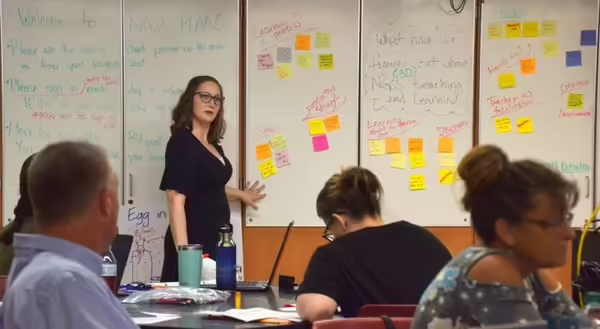
There is a correlation between improving science education and keeping the United States workforce strong and competitive. University of Illinois Extension and Bradley University Center for STEM Education have been partnering for many years, in a variety of ways, to help improve the learning environment for science, technology, engineering, and math (STEM) education throughout Central Illinois. This summer a new training opportunity called Next Generation Science Standards (NGSS) was provided to area educational leaders. NGSS incorporates the three dimensions of practices, core ideas, and crosscutting concepts to help students build a cohesive understanding of science over time.
The workshop “PLANS – Principals Learning About Networking & Supporting 3-Dimensional Science Learning” was designed to support instructional leaders in figuring out constructive strategies for mentoring teachers as they implement the Next Generation Science Standards. Twenty-one educational leaders including principals, instructional coaches, and department heads participated in this first introductory workshop.
Districts, schools, and teachers across the country are working on implementing a new vision for science classrooms based on the Framework for K-12 Science and NGSS: classrooms in which teachers support students in science and engineering practices for building and using science ideas to explain real phenomena and solve real problems.
A core challenge is the lack of curriculum materials that reflect the dramatic changes in this vision. Traditional textbooks, lesson plans, and units are not up to the challenge. Educators are finding that they need to find, adapt, or create new curriculum materials to support this 3D approach to science learning.
Participant evaluations highlighted the following:
- I have a better grasp on what the standards actually mean. I realize that these standards are rigorous and much more than just teaching content.
- I understand that this will most definitely take time to make the shift from the traditional method of teaching to this new exploratory learning.
- My biggest takeaway is including regular "productive talk" as an essential part of the lessons and student learning process.
- Classroom culture, modeling, and hands-on experiences really help promote student-developed learning.
- Student-led problem-solving techniques—allowing the exploration for student learning and the additional learning that occurs from correcting their own mistakes.
Educational leaders committed to implement the lessons in their schools. They planned to create work time before the school year started to encourage discussion and the classroom culture aspect needed to facilitate the student-developed learning environment. This shift requires that teachers use NGSS to encourage exploration instead of drilling facts, vocab, and concepts.
For additional information on how you or your school might engage with this exceptional programming opportunity visit mentormatchingengine.org or contact Kathie Brown, University of Illinois Extension educator, brownlk@illinois.edu.
ABOUT THE AUTHOR
Kathie Brown, University of Illinois Extension Community and Economic Development educator {retired June 2021} As a community and economic development educator, Kathie Brown works with community leaders, government officials, volunteer groups, small business owners, and others to help communities become stronger and more economically viable. She focuses on leadership and organizational development; local government education and relations; economic development strategies; participatory community planning/visioning processes; group process facilitation; collaboration and partnership building; public issue education; and understanding, using, and developing data.
Brown works with organizations and local governments to help them: (1) analyze and understand their needs, (2) identify alternative courses of action, (3) make informed decisions, (4) plan for the future, and (5) evaluate their development efforts.
Kathie has worked for Extension for almost 40 years, contributing to programs related to community health, digital literacy, STEAM education, and more.
This position focuses on the core skill areas of strategic planning, community leadership skills, data for decision making, needs assessment, and collaboration. Programmatic areas are leadership development, education for economic development, public policy education, and data/information and referral services.
ABOUT EXTENSION SNAPSHOTS
Extension Snapshots are monthly impact reports that share the stories of our programs in Fulton, Mason, Peoria, and Tazewell counties. To have them delivered to you directly sign up using our E-blast registration.